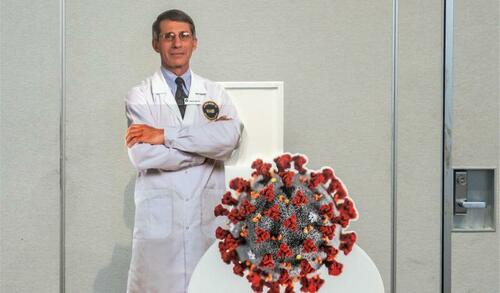Does Fauci Bear Any Responsibility? He Says No
Authored by Jayant Bhattacharya and Martin Kulldorff via The Brownstone Institute,
With millions of Americans getting infected and over 800,000 reported COVID-19 deaths, most people now realize that Washington’s pandemic policies failed.
Lockdowns just postponed the inevitable while causing enormous collateral damage on cancer, cardiovascular disease, diabetes, tuberculosis, mental health, education and much else.
So, the blame game is in full swing. At a recent Senate hearing, Dr. Anthony Fauci did not even attempt to defend his policies. Instead, he insisted that: “Everything that I have said has been in support of the CDC guidelines.”
Dr. Fauci, as director of the National Institute of Allergy and Infectious Diseases (NIAID), has worked closely with the two CDC directors, Drs. Robert Redfield and Rochelle Walensky, throughout the pandemic, but he is now laying the responsibility on them.
He did the same with his former boss, shortly after Dr. Francis Collins resigned as director of the National Institutes of Health (NIH).
Dr. Collins fiercely defended Fauci throughout the pandemic. In October 2020, the Great Barrington Declaration criticized Fauci’s lockdown strategy, calling for focused protection of high-risk older people while letting children go to school and young adults live near-normal lives. A few days later, Collins—a geneticist with little public health experience—wrote an email to Fauci suggesting a “take down” of the declaration, and characterizing its Harvard, Oxford and Stanford authors as “fringe epidemiologists.” Fauci agreed with his boss, but when asked about the incident at the recent Senate hearing, he responded that it “was an email from Dr. Collins to me.”
In other words, Fauci himself was just following orders.
As public health scientists and coauthors of the Great Barrington Declaration, we have been critical of the pandemic strategy championed by Drs. Collins, Redfield and Walensky. As human beings, we can only feel sympathy for the trio as Dr. Fauci seeks to deflect blame onto them. At the Senate hearing, Dr. Fauci did not engage in a substantive public health discussion to defend the pandemic strategy—as one might have expected from its principal architect and salesman. Understandably, politicians, journalists, academics and the public trusted Dr. Fauci. Why should they now shoulder the blame?
Dr. Fauci also defended himself by saying he has received death threats from “crazies.” It is tragic that scientists have to deal with such threats, a testament to the lack of civil scientific discourse during the pandemic. But Fauci is not alone in that respect. The organized “take down” that he and Collins orchestrated, with their grave mischaracterization of focused protection as a let-it-rip strategy, resulted in death threats and racist attacks against the Great Barrington Declaration authors. As Dr. Vinay Prasad of the University of California, San Francisco pointed out, the NIH director’s “job is to foster dialogue among scientists and acknowledge uncertainty. Instead, [Collins] attempted to suppress legitimate debate with petty, ad hominem attacks.”
Strangely, the Senate is the only venue where Dr. Fauci has faced scientific scrutiny. That important role fell on Dr. Rand Paul, one of the few senators with medical training. America would have been better served if Dr. Fauci had engaged public health scientists with divergent views in civilized debates outside the political environment of the Senate chamber. If Dr. Fauci had embraced open and civil discussion, the public may have benefited from better pandemic policies, such as:
-
More accurate public health communication with less fearmongering, emphasizing that there is more than a thousandfold difference in COVID mortality risk between the old and the young.
-
Better-focused protection of older and other high-risk Americans, using specific, concrete standard public health measures proposed by the Great Barrington Declaration.
-
Open schools and universities with in-person teaching of all children and students.
-
Less collateral public health damage.
-
Less devastation on the poor and working class worldwide.
-
Rapidly conducted NIH/NIAID-funded randomized clinical trials of generic drugs to determine what works to treat COVID patients early. If as much effort had been poured into these evaluations as was devoted to vaccines, many lives might have been spared.
-
Recognizing the natural immunity of the COVID recovered and using them to protect nursing home residents and frail hospital patients.
-
More targeted vaccinations instead of vaccine passports, and a faster and more thorough evaluation of vaccine safety to increase public confidence in vaccines.
Unfortunately, sitting atop the world’s largest stash of infectious disease research money, with an annual NIAID budget of over $6 billion, Dr. Fauci was able to command the nation’s pandemic strategy with little opposition from other infectious disease scientists.
As the pandemic ends, as all pandemics do, the scientific community has much work to do to regain public trust. The collateral damage arising from the failures of pandemic management includes a broader distrust by the public of the academic community. While only a few scientists are responsible for the misguided pandemic strategy, all scientists—whether we are chemists, biologists, physicists, geologists, economists, sociologists, psychologists, public health historians, clinicians, epidemiologists or in some other field—now share a responsibility to restore trust in science and academia. The first step is to acknowledge the mistakes made.
https://ift.tt/a2wCO8L
from ZeroHedge News https://ift.tt/a2wCO8L
via IFTTT





0 comments
Post a Comment